De Jamaicaanse schrijver Colin Channer werd geboren op 13 oktober 1963 in Kingston. Zie ook alle tags voor Colin Channer op dit blog.
Mimic
I.
From the chopper shot
the beach is a golden border
on a brown-gray shack town,
a jumble on a point,
sweet flourish of Liberia
sweeping into waves.
My son and I are watching
this in lamplight from our low
brown armless couch,
iced roibos on the low wood table
where I keep a bowl of beat-up cricket balls,
a wink to where he indirectly comes from,
Makonnen, Brooklyn teenager
with Antillean roots
replanted in Rhode Island,
a state petiter than the country
where my navel string was cut.
He’s a boy who loves sketching,
drawing cartoons, eating fish and pasta,
swimming, but most of all
performing accents, likes how
they jokify the mouth.
He was born with the ears of a mimic,
a tight connect between what makes a sound
and how to counterfeit it, make it feel
authentic near its place of birth.
On screen, the camera jerks
behind an ex-warlord
up chipped-up stairs
to a big slab roof.
Here, he’s questioned by
a pink and meaty hipster,
dude keen to talk to men
who say they ate their foes in war.
This one here refers
to chopping wide the backs of children,
mimes reaching in the crack
to pluck a heart,
and munching it before a fight
for blood and courage,
naked at times, or done drag,
boots with wigs and dresses,
amulets and other charms,
the more bizarre
the better hidden.
Spirits can evade
the human eye.
Maki echoes all the interviewer’s
LA nasals. I laugh hard.
But when he takes on
a Liberian accent
I do not take it well
although I’m twisted
by the sketch, a poly-vocal
back-and-forth involving riots.
It’s peacetime and we’re at
Monrovia’s first McDonald’s.
Folks are vexed.
The burgers aren’t made
from human flesh.
I gently tell him he,
well, we shouldn’t joke too much
about this awful war,
and blah blah on about this country
founded on the coast of Guinea
by ex-chattel,
guide him through the marsh
of history to the present,
leading as a father should a son.
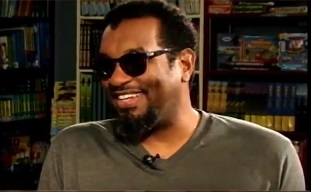
Colin Channer (Kingston, 13 oktober 1963)
De Nederlandse schrijver Herman Franke werd geboren op 13 oktober 1948 in Groningen. Zie ook mijn blog van 13 oktober 2010 en eveneens alle tags voor Herman Franke op dit blog.
Uit: Wolfstonen
“Ik ben een grote jongen, zei hij zomaar, toen hij nog heel klein was. De kamer zat vol mensen; er kwam rook uit hun monden want ze stonden van binnen in brand. Daarom dronken ze zoveel, met blusschuim en zo. Zijn vader lachte, zijn moeder lachte, iedereen lachte, zelfs de oom met gouden tanden die altijd alleen maar zichzelf grappig vond. Hij bleef het zeggen, ook toen niemand meer lachte. Als hij bang was of voor de gek gehouden werd, zei hij het, of als de zon op zijn gezicht scheen en een lauw windje zijn nek streelde. Ik ben een grote jongen. Dat moet je niet steeds zeggen, zei zijn moeder, gehurkt, zodat haar gezicht bijna het zijne raakte, met een stem die ze tevergeefs dwong kwaad te laten klinken. De rode vlekken in haar hals veranderden voor zijn ogen in veelkoppige monsters die elkaar op leven en dood bevochten. Uiteindelijk sloeg zijn vader hem voor zijn kop. Maar hij huilde niet. Ik ben een grote jongen, zei hij. Ze gaven het op. Iedereen noemde hem toen allang, klein als hij was, Grotejonge. En tegen beter weten in geloofde men dat het daardoor kwam, of doordat zijn openlijk uitgedragen zelfbeeld fysieke bevestiging zocht, dat hij al op zijn veertiende zijn vader boven het hoofd groeide en zijn bijnaam op spectaculaire wijze waarmaakte. Op zijn zestiende kon iedereen zien dat hij wis en waarachtig een grote jongen was, met machtige schouders en reuzenhanden. Zware leren voetballen kon hij met een hand oppakken, zelfs als ze nat en glibberig waren. Waar hij binnenkwam, verdween licht. Niemand wist meer hoe hij echt heette, Grotejonge zelf ook niet. Hij zei nog maar heel soms, en alleen als niemand hem kon horen, dat hij een grote jongen was. Maar hij dacht het wel vaak, vaker dan hij het ooit gezegd had toen hij nog klein was.
Hij ging naar een bijzondere school want gewoon rekenen kon hij niet, hij kon alleen vrij rekenen wat inhield dat de uitkomst van drie plus vijf elk getal kon zijn dat hem het juiste toescheen omdat het regende of heel warm was, of omdat het eerste meisje dat hij die dag was tegengekomen naar hem had geglimlacht. Lezen leerde hij snel, maar als hij iets moest opschrijven, dacht hij wel aan de goede letters maar hij schreef de verkeerde op. Hij kon het dezelfde dag nog teruglezen, maar de volgende dag niet meer. Zijn leerproblemen hadden iets geniaals, dat voelden de leraren wel aan, maar ze wisten niet wat ze met hem aanmoesten.”
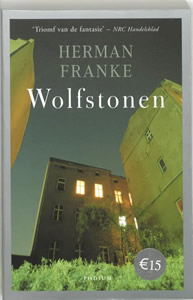
Herman Franke (13 oktober 1946 – 14 augustus 2010)
Cover
De Indiase dichter, schrijver, librettist en muzikant Jeet Thayil werd geboren op 13 oktober 1959 in Kerala. Zie ook alle tags voor Jeet Thavil op dit blog.
Cut To Bits By The Sickle Moon
Who has done this?
Schoolboys, drained of
all emotion but the one
that’ll outlast them,
kneeling on the sands in
waves through the two
thousands, learning the
fundaments of blood
sacrifice as the correct
response to figurative art.
Superpower
Leap tall buildings in a single bound? Forget
you, buddy, I
leap years, avenues,
financial/fashion/meatpacking districts, 23
MTA buses parked end to
end. I leap Broadway,
yoyo to
traffic light, to
bus top, to Chrysler, to jet.
You need a mind of sky, of rubber,
to understand I. You need
silence, cunning. Exhale!
You need to know that everything is metaphor,
that poems sprout
in my hands
like mystic confetti, like
neural string theory.
My brother, Mycroft, is tiny, but a genius,
oh a tiny genius, whose
“art is subtle, a precision of hallucinatory brilliance,”
—that’s serious talk, boy—
he’s ‘furthermore’ and ‘however,’ I’m
“know what I’m saying?” and ‘whatever.’
He is the ghost ant, the one who is not
there, unseen until he stops
moving. I am
companion to owl and peregrine,
emperor of air, and I’m loyal
to you my loyal subject, whose hard-won
pleasure I perform,
and though I’m not rich it takes a lot
of cash to keep me
in the poverty to which I’m accustomed.
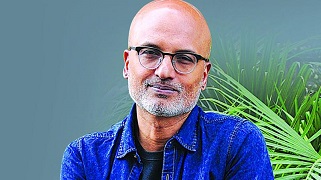
Jeet Thayil (Kerala, 13 oktober 1959)
De Duitse schrijver en journalist Sebastian David Fitzek werd geboren op 13 oktober 1971 in Berlijn. Zie ook alle tags voor Sebastian Fitzek op dit blog.
Uit: Das Joshua Profil
„Dreizehn Leichen, elf vergewaltigte Frauen, sieben Verstümmelungen, ebenso viele Entführungen und zwei an ein Heizungsrohr angekettete Schwestern, die qualvoll verhungern würden, sollte man sie nicht rechtzeitig inden. Ich war zufrieden mit meiner bisherigen Bilanz, und eigentlich hätte ich ihr heute Nachmittag noch einen weiteren Mord hinzugefügt, wenn ich nicht um 15.32 Uhr gestört worden wäre, als ich gerade mit einem wehrlosen Opfer auf dem Weg in die Berliner Kanalisation war.
Zuerst hatte ich versucht, das Klingeln zu ignorieren; normalerweise schaltete ich mein Handy während der Arbeit ab, aber heute war Montag, und montags war ich mit dem Fahrdienst für unsere zehnjährige Tochter an der Reihe, selbst wenn meine Frau ausnahmsweise mal im Lande war, was wegen ihres Jobs als Langstrecken-Pilotin leider nur sehr unregelmäßig vorkam.
Zwar kannte ich die Nummer im Display nicht, doch es war ungefähr die richtige Uhrzeit. Jolas Schwimmtraining musste gerade vorbei sein, und vielleicht rief sie ja mit dem Telefon einer Freundin an. Ich entschied mich, den Anruf besser nicht auf die Mailbox laufen zu lassen, auch auf die Gefahr hin, gleich einen Callcenter-Agenten am Ohr zu haben, der mir eine Zahnzusatzversicherung oder ein Pay-TV-Abo aufschwatzen wollte und den es nicht im Geringsten kümmerte, dass ich seit Monaten mit dem Dispo im Minus hing.
Und so hatte ich entnervt mit der Zunge geschnalzt, das Kapitel des Thrillers, an dem ich gerade arbeitete, mitten im Satz zwischengespeichert und nach dem surrenden Handy auf meinem Schreibtisch gegriffen. Was, um es kurz zu machen, der Grund dafür war, weshalb ich jetzt im Stau auf der Avus Höhe Hüttenweg stand und von meiner Tochter fünf Euro verlangte.
»Die zahl ich nicht.« Jola schüttelte den Kopf und schaute trotzig aus dem heruntergekurbelten Seitenfenster in Richtung der S-Bahn-Gleise, die hier parallel zur Stadtautobahn verliefen.
Es war Mitte August, wir standen in der prallen Sonne, vor uns limmerte die Luft über den Dächern der Blechlawine, und ich hatte das Gefühl, in einem Schnellkochtopf und nicht in meinem alten VW Käfer zu sitzen.
»Wir haben eine Abmachung«, erinnerte ich sie. Fünf Euro für jedes Mal, wenn ich zu einem »Elterngespräch« gebeten wurde, weil sie wieder etwas angestellt hatte.
»Ich dachte, das gilt nur für die Schule. Nicht für die Freizeit.«»Du vergisst, dass Herr Steiner nicht nur dein privater Schwimm-, sondern auch dein ofizieller Sportlehrer ist. Also her mit dem Geld!«
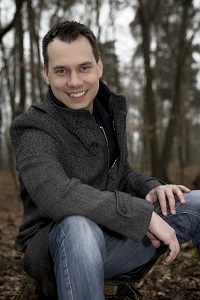
Sebastian Fitzek (Berlijn, 13 oktober 1971)
De Amerikaanse dichter, literair criticus, essayist en vertaler Richard Joseph Howard werd geboren op 13 oktober 1929 in Cleveland, Ohio. Zie ook alle tags voor Richard Howard op dit blog.
Crepuscular
Late in the afternoon the light
at this tapering end
of Long Island not so much fails
as filters out the sun,
and in a month amid stances
restores the word twilight
to its original senses:
the day between, or half
itself, as when Locke alluded
to “the twilight of probability.”
But if at this moment I see
its application, still
the word comes hard, appalling me
in poetry it sounds
too much like toilet, and Verlaine
becomes impossible
to translate, for instance, even
when the real thing happens
around me, as at this moment.
Should reality sound poetical?
I sit at the French window (why
else worry about Verlaine?)
worrying too about Robert Frost
who said either we write
out of a strong weakness (poets
love oxymoronic forms)
for the Muse, or we write because
it seems like a good idea
to write. As the day tapers off
like the island, I wonder at my choice.
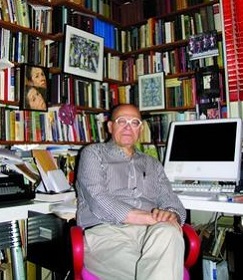
Richard Howard (Cleveland, 13 oktober 1929)
De Albanese dichter Migjeni (eigen. Millosh Gjergj Nikolla) werd geboren op 13 oktober 1911 in Shkodra. Zie ook mijn blog van 13 oktober 2010 en eveneens alle tags voor Migjeni op dit blog.
Poem Of Poverty (Fragment)
Poverty shines in the eyes of the newborn,
Flickers like the pale flame of a candle
Under a ceiling blackened with smoke and spider webs,
Where human shadows tremble on damp stained walls,
Where the ailing infant wails like a banshee
To suck the dry breasts of its wretched mother
Who, pregnant again, curses god and the devil,
Curses the heavy burden of her unborn child.
Her baby does not laugh, it only wastes away,
Unwanted by its mother, who curses it, too.
How sorrowful is the cradle of the poor
Where a child is rocked with tears and sighs.
Poverty’s child is raised in the shadows
Of great mansions, too high for imploring voices to reach
To disturb the peace and quiet of the lords
Sleeping in blissful beds beside their ladies.
Poverty matures a child before its time,
Teaches it to dodge the threatening fist,
The hand which clutches its throat in dreams,
When the delirium of starvation begins
And when death casts its shadow on childish faces,
Instead of a smile a hideous grimace.
While the fate of a fruit is to ripen and fall,
The child is interred not maturing at all.

Migjeni (13 oktober 1911 – 26 augustus 1938)
Shkodra
De Amerikaanse dichter en schrijver Arna Wendell Bontemps werd geboren op 13 oktober 1902 in Alexandria in Louisiana. Zie ook mijn blog van 13 oktober 2010 en eveneens alle tags voor Arna Wendell Bontemps op dit blog.
Uit: A Summer Tragedy
„Old Jeff Patton, the black share farmer, fumbled with his bow tie. His fingers trembled and the high, stiff collar pinched his throat. A fellow loses his hand for such vanities after thirty or forty years of simple life. Once a year, or maybe twice if there’s a wedding among his kinfolks, he may spruce up, but generally fancy clothes do nothing but adorn the wall of the big room and feed the moths. That had been Jeff Patton’s experience. He had not worn his stiff-bosomed shirt more than a dozen times in all his married life. His
swallow-tailed coat lay on the bed beside him, freshly brushed and pressed, but it was as full of holes as the overalls in which he worked on weekdays. The moths had used it badly. Jeff twisted his mouth into a hideous toothless grimace as he contended with the obstinate bow. He stamped his good foot and decided to give up the struggle.
“Jennie,” he called.
“What’s that, Jeff?” His wife’s shrunken voice came out of the adjoining room like an echo. It was hardly bigger than a whisper.
“I reckon you’ll have to he’p me wid this heah bow tie, baby,” he said meekly.
“Dog if I can hitch it up.”
Her answer was not strong enough to reach him, but presently the old woman came to the door, feeling her way with a stick. She had a wasted, dead-life appearance. Her body, as scrawny and gnarled as a string bean, seemed less than nothing in the ocean
of frayed and faded petticoats that surrounded her. These hung an inch or two above the tops of her heavy unlaced shoes and showed little grotesque piles where the stockings had fallen down from her negligible legs.
“You oughta could do a heap mo’ wid a thing like that’n me—beingst as you got yo’ good sight.”looks like I oughta could,” he admitted. “But my fingers is gone democrat on me. I get all mixed up in the looking glass an’ can’t tell wicha way to twist the devilish thing.”
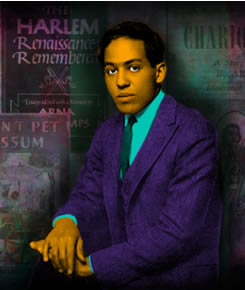
Arna Wendell Bontemps (13 oktober 1902 – 4 juni 1973)
In 1923
De Amerikaanse schrijver Conrad Richter werd geboren op 13 oktober 1890 in Pine Grove, Pennsylvania. Zie ook mijn blog van 13 oktober 2010 en eveneens alle tags voor Conrad Richter op dit blog.
Uit: The Awakening Land
“A strange, uneasy feeling ran over him. If he had been wrong about his mother in this, might he by any chance have been wrong in other things about her also? Could it be even faintly possible that the children of pioneers like himself, born under more benign conditions than their parents, hated them because they themselves were weaker, resented it when their parents expected them to be strong, and so invented all kinds of intricate reasoning to prove that their parents were tyrannical and cruel, their beliefs false and obsolete, and their accomplishments trifling? Never had his mother said that. But once long ago he had heard her mention, not in as many words, that the people were too weak to follow God today, that in the Bible God made strong demands on them for perfection, so the younger generation watered God down, made Him impotent and got up all kinds of reasons why they didn’t have to follow Him but could go along their own way.”
(…)
“Hardship and work, that’s what his mother always harped on. Once when he had refused to work on the lot, she had said, “You’re going to live longer than I do, Chancey. Watch for all kinds of new-fangled notions to take away folks’ troubles without their having to work. That’s what folks today want and that’s what will ruin them more than anything else.” Could there be something after all in this hardship-and-work business, he pondered. He had thought hardship and work the symptoms of a pioneer era, things of the past. He believed that his generation had outlived and outlawed them, was creating a new life of comfort, ease and peace. And yet war, the cruelest hardship of all, war between brothers, was on them today like a madness. Did it mean that the need for strength and toughness was to be always with them; that the farther they advanced, the more brilliant and intelligent they became, the more terrible would be the hardship that descended upon them, and the more crying the need of hardihood to be saved.”

Conrad Richter (13 oktober 1890 – 30 oktober 1968)
Cover DVD
De Britse romanschrijfster en gewezen politica Edwina Currie werd geboren in Liverpool op 13 oktober 1946.Zie ook alle tags voor Edwina Currie op dit blog en ook mijn blog van 13 oktober 2010.
Uit: Diaries
“2 October:
“I saw B again on Friday: I was in the area where he lives, and he and his wife offered their home for a rest, which I appreciated …
“To my horror, the magic started to work again and in a very big way. When we parted he held my hand a long time and squeezed it, even though other people were there…
“I sat on the bed while he sat on the stool near the mirror – what did he think I was going to do while his wife was in the kitchen?
“He offered me hospitality for the night, but I said no; when he pressed me I whispered, I couldn’t take it, couldn’t cope …
“Sounds like a schoolgirl escapade or a Mills & Boon book, doesn’t it? But this man is very special, and I think he finds himself equally surprised and pleased that I’m his, as I do that he cares for me.
“It’s not just sex, it’s a very high regard too…
“When I needed a lover, again I chose too well, for I didn’t expect to love this man – and I do, very much indeed.
“All weekend I’ve been feeling his hand on mine and it turns my heart over.
“I weep for what I don’t have, with the increasing certainty that I want it very much and somehow will have it again.”

Edwina Currie (Liverpool, 13 oktober 1946)
